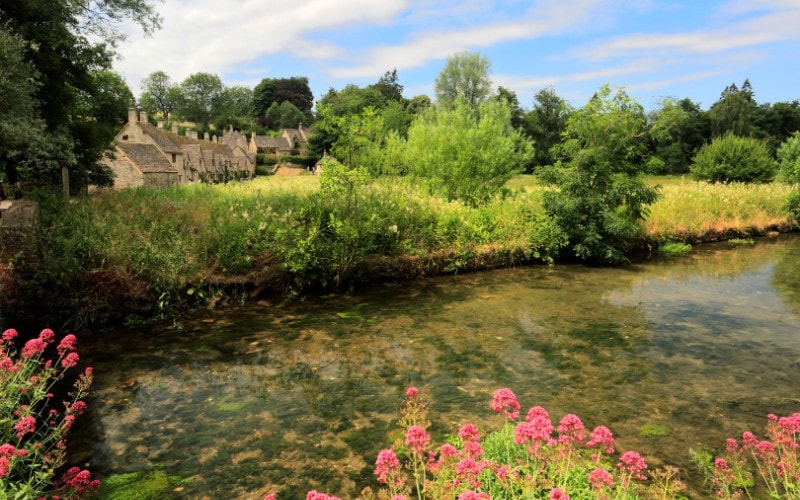Exploring the Cotswolds with Go Cotswolds Tours
If you have more than a few days to spare in England, spend them touring the delightful Cotswolds.
Let yourself be lured, as I was, by photos of peaceful villages nestled against chocolate-box perfect country scenes.
A quick Google search in the depths of last winter brought me to the Go Cotswolds website. Their most popular tour is Cotswolds in a Day.
It’s very reasonably priced for a full day in a mini bus with an expert guide. Check the website for details.
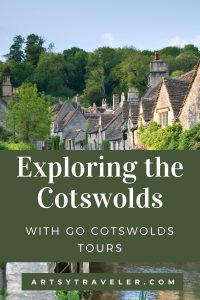
Highlights of the Go Cotswolds Tour
- View from Dover Hill
- Solitary walk in Chipping Camden
- Lunch at the “oldest pub in England” in Stow-on-the-Wold
- Strolling around postcard-perfect Bilbury
- Secret walk in Bourton-on-the-Water
The Go Cotswolds Tour Begins
At precisely 9 am, a sixteen-seater van pulls up in front of the Pen and Parchment Inn in Stratford-upon-Avon where I stayed the night.
Out jumps the very friendly and knowledgeable Colin. He’s lived in the Cotswolds for 30 years and obviously loves sharing it with visitors. He stows my luggage in the back (I’m leaving for Birmingham at the end of the tour) and ushers me on to the bus.
Off we go! The Go Cotswolds tour included six stops and many, many miles of scenic driving. Colin keeps up a lively commentary, and at every stop goes out of his way to engage with everyone. He’s one of the best guides I’ve ever experienced.
Map of the Go Cotswolds Tour
Here are the places we visited on the map. It’s amazing how much there was to see in a relatively small geographic area!
Dover Hill
Our first stop is Dover Hill (#1 on the map above) overlooking a stunning view of the Cotswolds over the Vale of Evesham. On a clear day, the view includes the towers of Birmingham and the foothills of the Welsh mountains.
A bit of mist on the horizon obscures some of the view, but it’s still amazing.
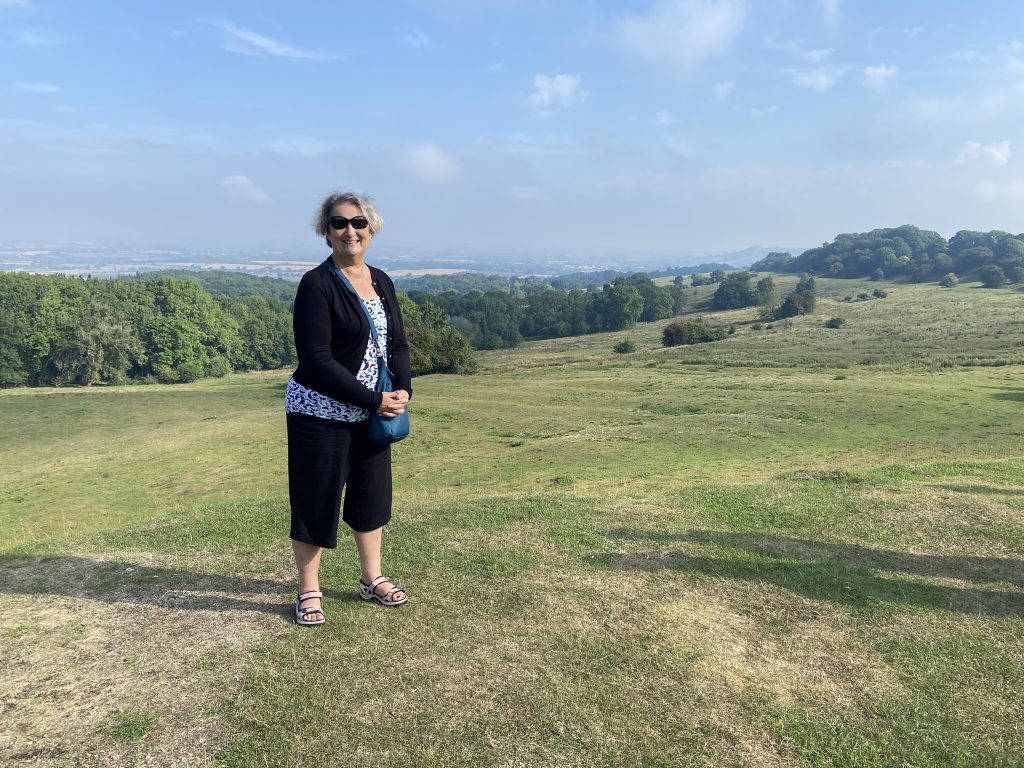
Colin tells us that this hill is the site of the annual (apart from the past two years) Robert Dover’s Olimpick Games. And yes, Olimpick is how they spell it!
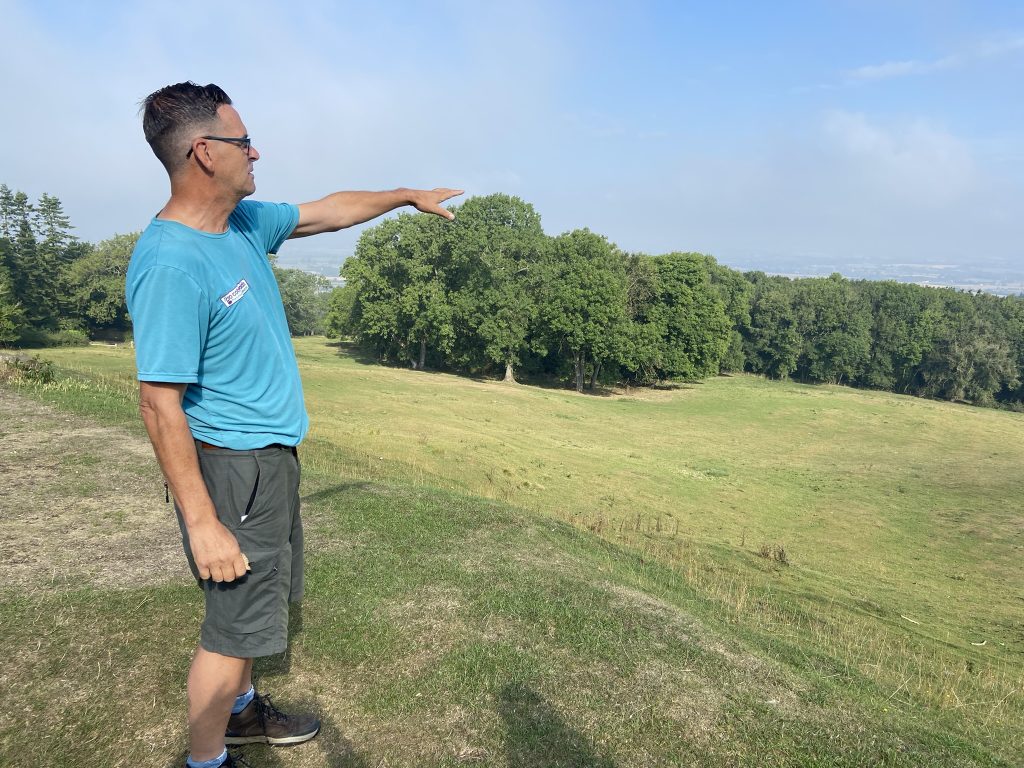
Events include such quirky activities as shin kicking and cheese rolling. Colin provides lively descriptions and directs us to check out the video proof on YouTube. Here’s a link to one of them.
Colin takes a picture of the tour group on top of Dover Hill before we all pile back into the bus to set off to our next stop.
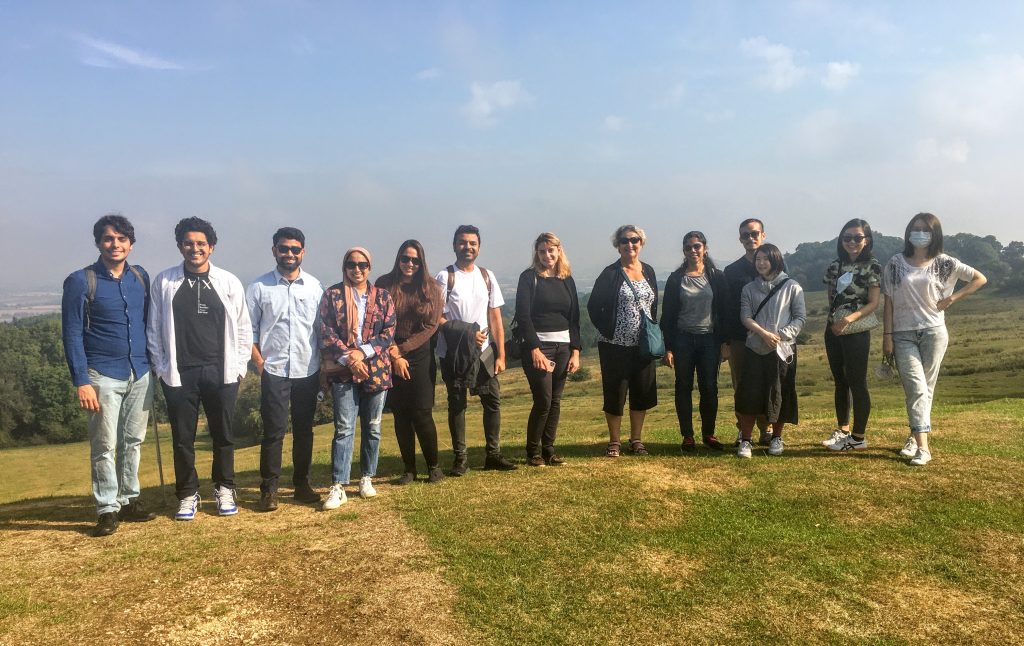
Chipping Camden
As he skillfully navigates winding country roads, Colin describes how the use of the creamy, butter-colored Cotswolds stone defines the region. In fact, no new buildings may be built out of any other material.
The local government carefully controls all development in the area, which has become a very expensive and fashionable area in which to live. We pass many gorgeous homes, some thatched, some with the iconic grey slate roofs. Each is impeccably maintained.
Maintaining Cotswolds Homes
Colin tells us that a friend paid 75,000 GBP to have his home re-thatched (a necessity every few decades). He also explains that a major effort is underway to train a new generation of craftspeople to tend to all the wonderful old homes in the area.
Young people are encouraged to enter apprentice programs straight out of school to train for a trade that will pay very well and guarantee a lifetime of work.
As a retired educator myself, I am heartened to hear about such skills-based programs.
A Walk through Chipping Campden
Chipping Campden (#2) at 10 am is quiet and peaceful. Colin advises us to take a walk to see a selection of thatched-roof cottages. I take his advice and set off. No one else follows so I’m alone for most of the walk.
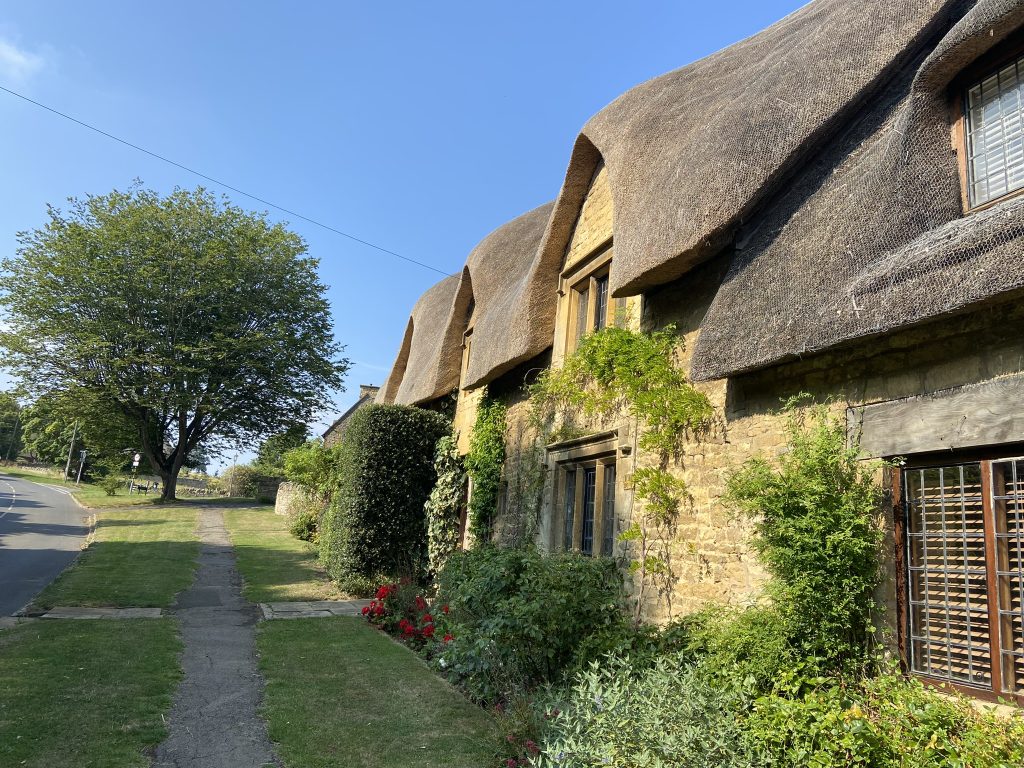
Birds chirping, sun gently shining, a rainbow of flowers spilling forth from every garden, quaint cottages—all boxes ticked.
The walk takes me in a broad circle that leads back to the main street of Chipping Campden. I wander happily up and down the street, admiring the quirky little shops, stopping at a cute little tea room (all the tea rooms are cute; I think it’s a bylaw) for a milky coffee, and checking out the market hall.
Built in the 17th century to provide shelter for market traders, the National Trust now owns the hall which still shelters traders. When I’m there, the goods on offer are primarily sheepskins.
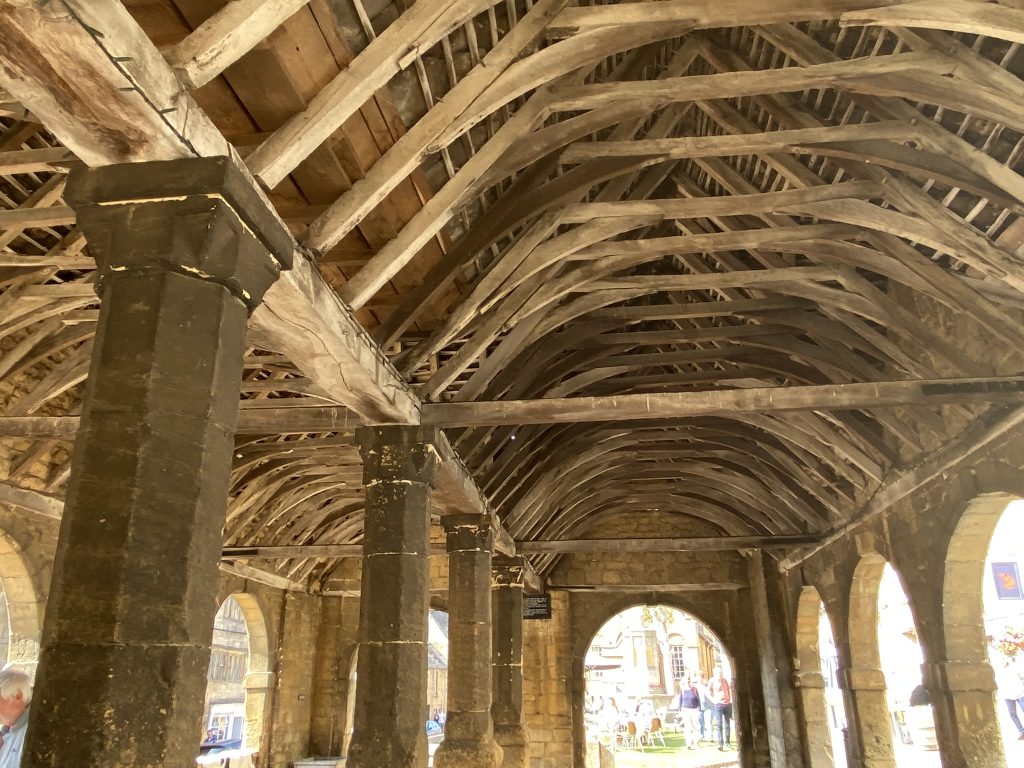
Snowshill
The tiny village Snowshill (#4) is famous for its gorgeous views and as the setting for an iconic scene in the movie Bridget Jones’s Diary. We are lucky to arrive when no other tourists are around. Unchanged for centuries, the village is a delight. The only sounds are the wind rustling through the trees and the plump cooing of wood pigeons.
I take some shots of the famous village street and hike up a hill to look out over a stunning view of the Severn Vale.
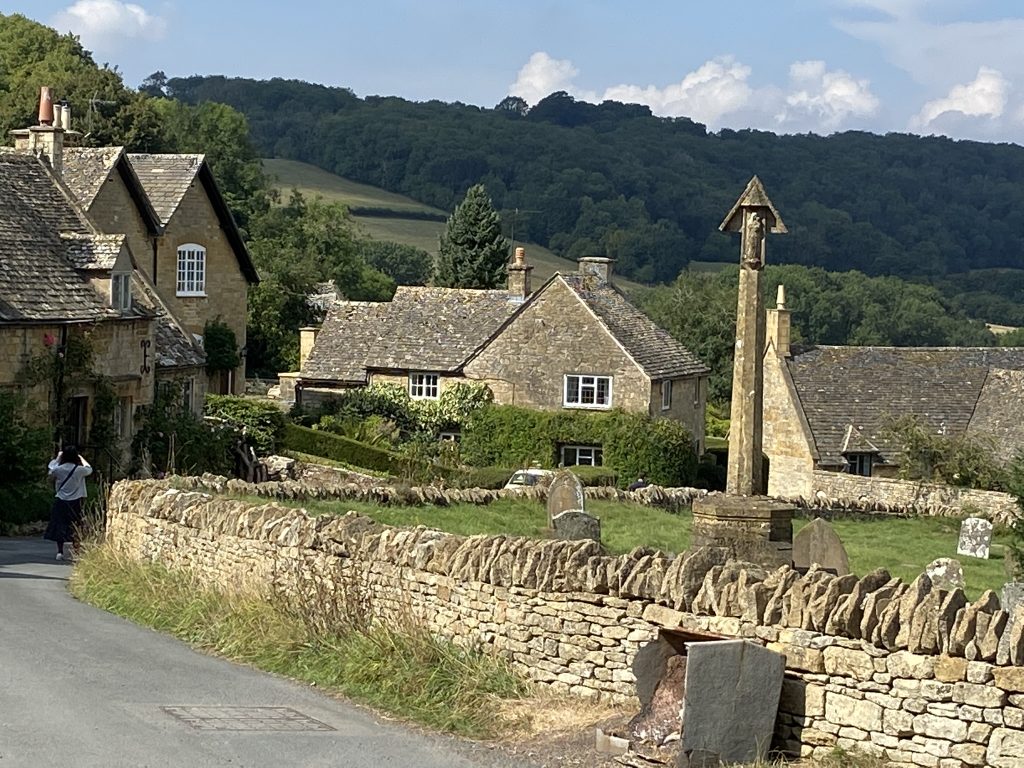
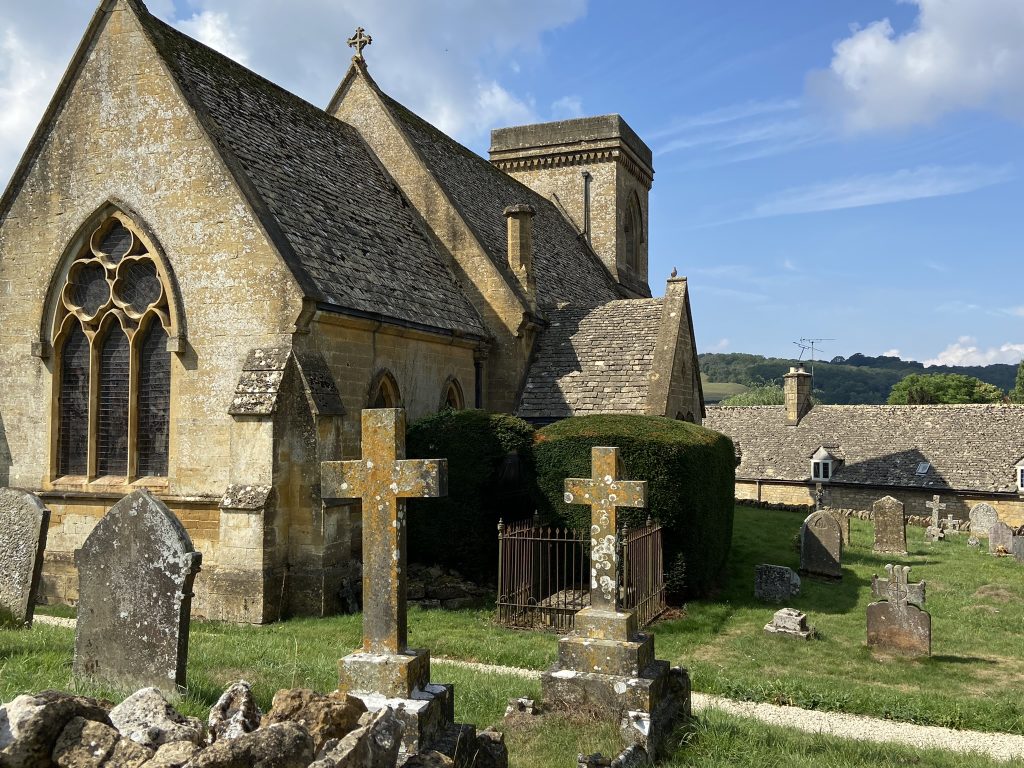
Nearby is Snowshill Manor, a National Trust property that includes picturesque gardens and an eclectic collection of toys, musical instruments, clocks, bicycles, samurai armour and more. We didn’t visit, but it sounds pretty cool!
Stow-on-the-Wold
More driving along even more achingly adorable country roads brings us to Stow-on-the-Wold (#5), one of the largest towns in the Cotswolds and our lunch stop. The town is thriving as a result of tourism. There’s a surfeit of ancient pubs and more cute tea rooms and plenty of shops, all of which, according to Colin, are independently owned. Franchises such as Starbucks do not exist in Cotswolds villages which makes a nice change.
Lunch at the Oldest Pub in England
I choose to have my lunch at the Porch House, billed as “the oldest pub in England.” I decide to go there after hearing from Colin that it was established in 947. The phone prefix for landlines on Bowen Island where I live is 947. I love the coincidence!
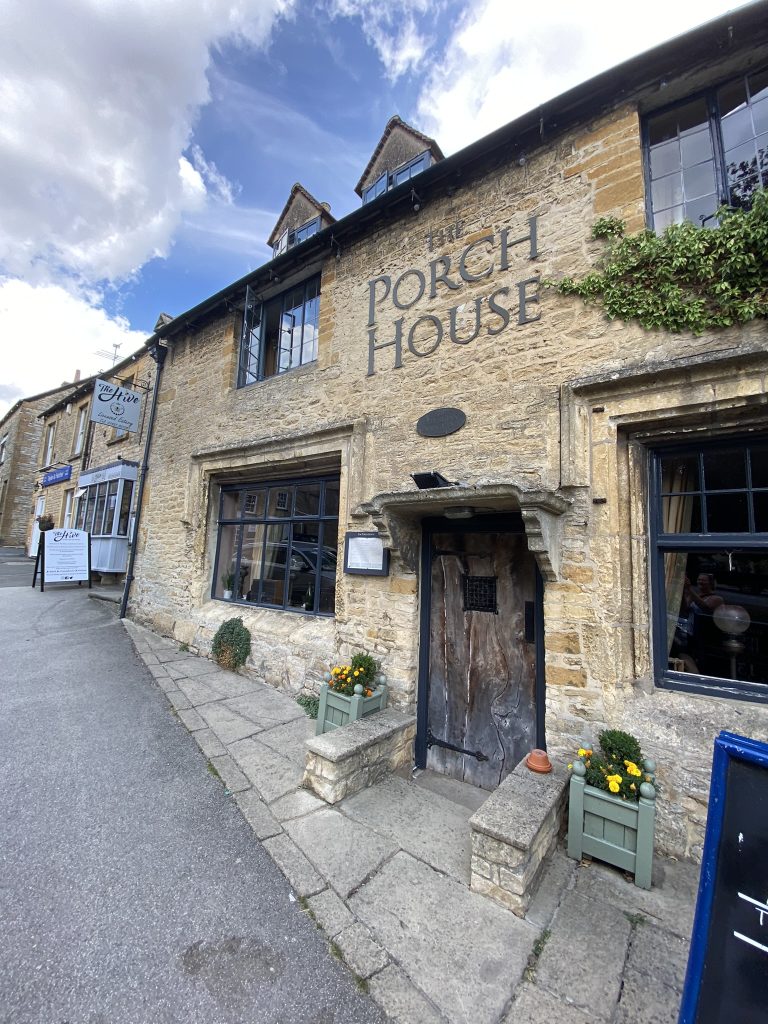
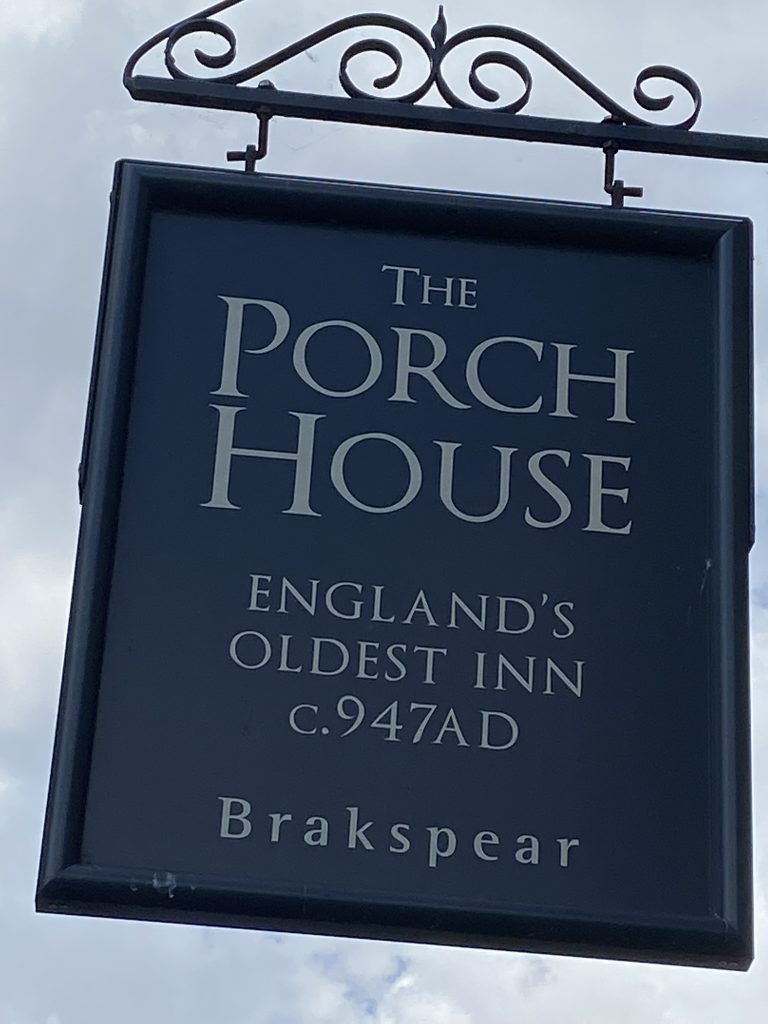
The Waldorf salad I order is very tasty, loaded with a great many satisfying lumps of local blue cheese, crisp green apple slices, candied walnuts and lots of fresh veggies.
I can’t help comparing the food I’m eating in 2022 to what passed for food in the 1970s when lived in England as a student. First off, we never ate in restaurants which was just as well because we had no money and restaurants were very few and far between in those days. And second, the British had a well-deserved reputation for tasteless food.
I remember sharing meals with my flatmates when I was a student at Reading University (1974-77) and everyone oohing and aahing over a “lovely” plate of cauliflower cheese—brown rice cooked until it turned white and lost every iota of texture, cauliflower cooked until it turned grey, and mild white cheddar (no taste whatsoever) melted in great blobs over the whole. Lovely indeed.
St. Edward’s Church in Stow-on-the-Wold
After lunch, I make a quick photo stop at St Edward’s Church to check out a mystical doorway that many say looks like a portal to another realm. J.R.R. Tolkien certainly thought so. Ancient yew trees flank the doorway which allegedly inspired his Doors of Durin in the Lord of the Rings trilogy.
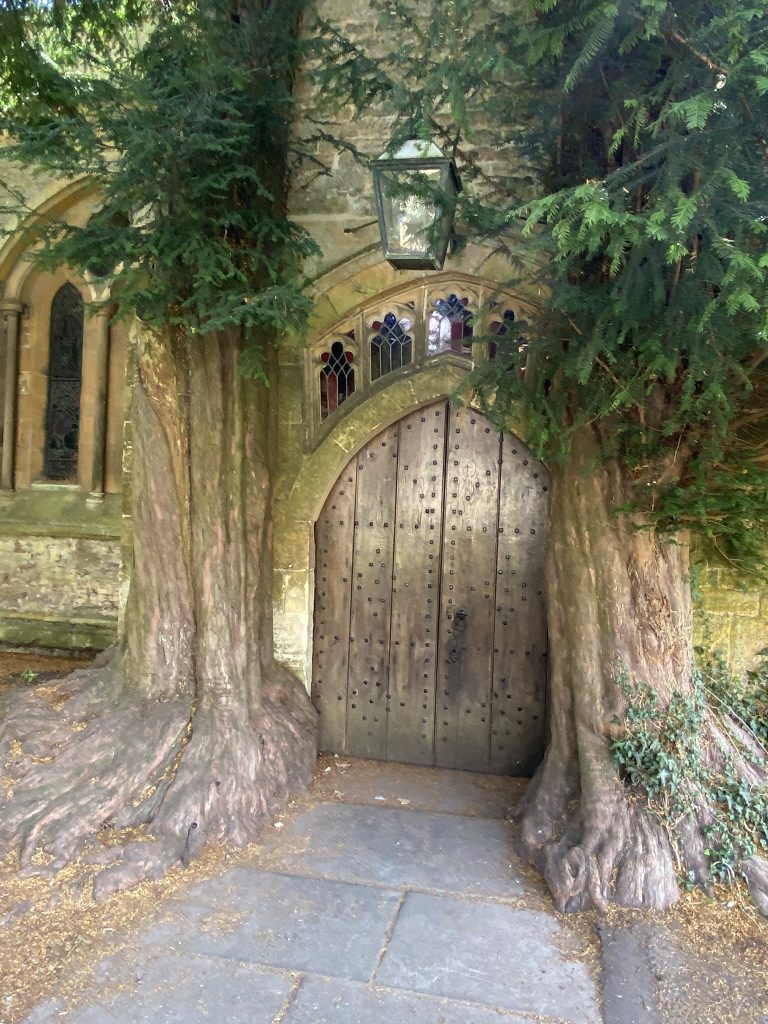
Driving Backcountry Cotswolds
Back on the bus, Colin takes us down even more back country lanes through the Coln Valley on the way to the town of Bilbury which he says will be crowded (he’s right!). But to counteract the crowds to come, he treats us to a long, meandering drive through some of the most idyllic countryside in England.
The tiny villages look like they haven’t changed in centuries, which is more or less true. No wonder there’s been an exodus in recent years from the big cities to the countryside with the result that real estate prices in the area are now sky high.
Bilbury
It’s a bank holiday Saturday, and thousands of people have converged upon tiny, sweet little Bilbury (6). Described by William Morris as “the most beautiful village in England,” Bilbury really does put the charm in charming.
Arlington Row in Bilbury
Bilbury’s main claim to scenic fame is the row of cottages known as Arlington Row, reputed to be the most photographed and beautiful cottages in the country. People live in the cottages, which must be a challenge in the summer. Hundreds of visitors file slowly past, each hoping to snap a picture of the row without other visitors in the way.
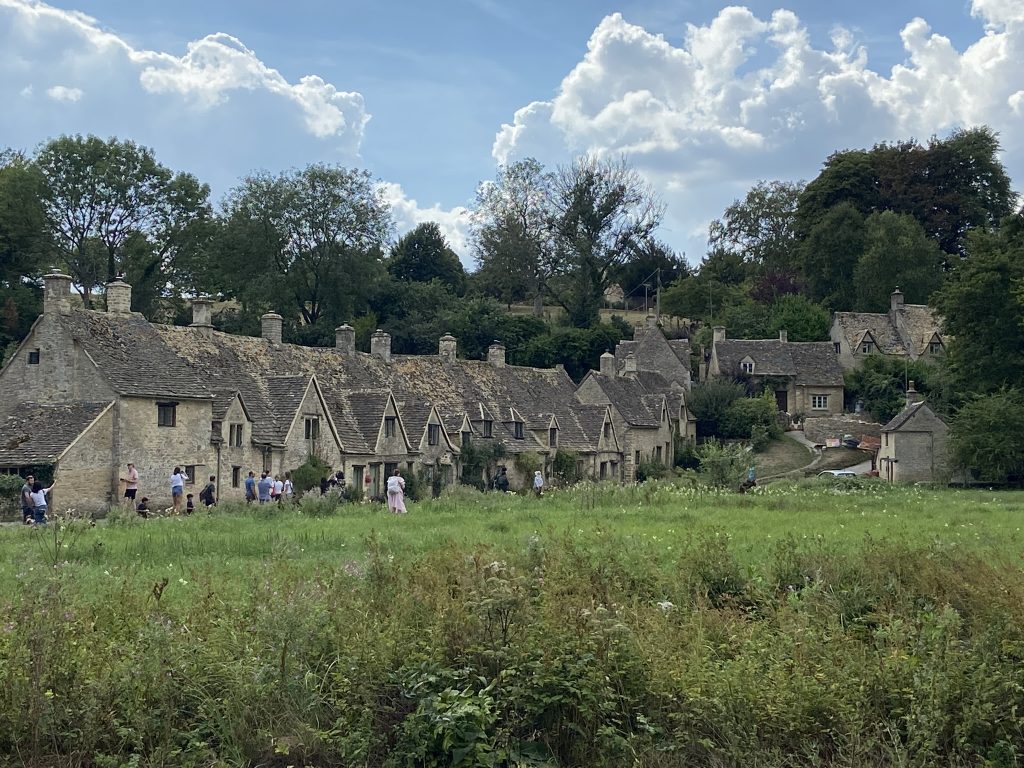
It’s an impossible task, although like everyone else, I try.
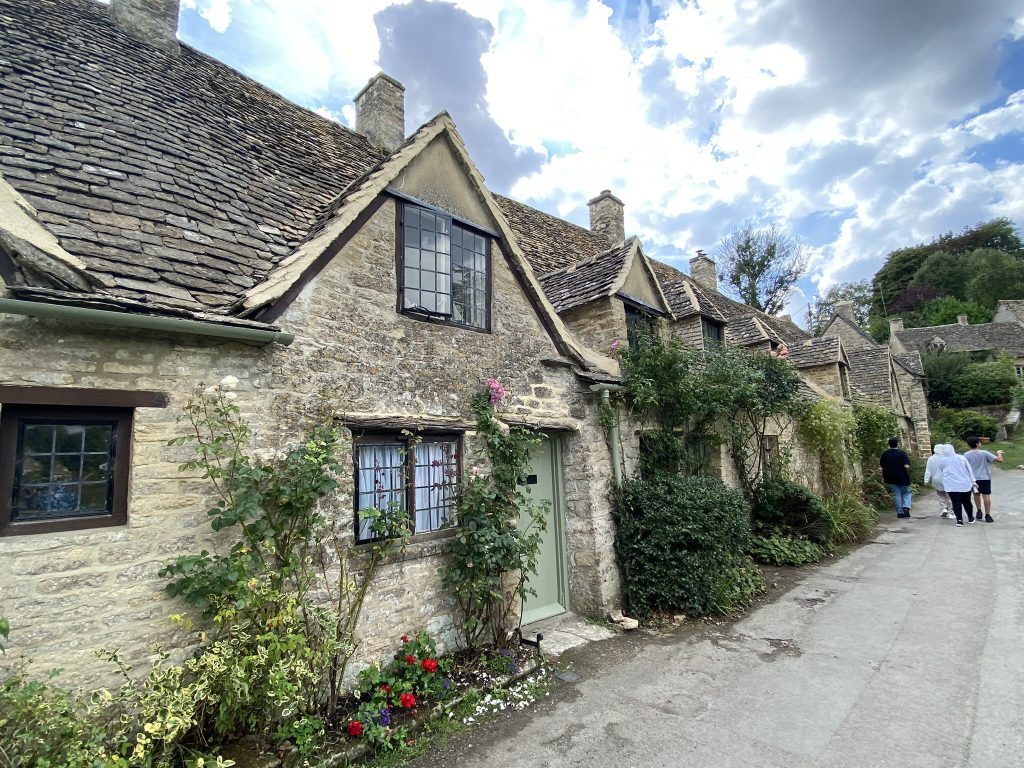
The cottages date from 1380 when they were built as a monastic wool store. In the 17th century, the building was converted into a row of weavers’ cottages. A fifteen-minute stroll takes me from the car park alongside the meandering River Coln to the cottages and then back on a lovely shady path next to a boggy water meadow known as Rack Isle. Back in the car park, several ice cream shops beckon. I treat myself to a salted caramel ice cream cone.
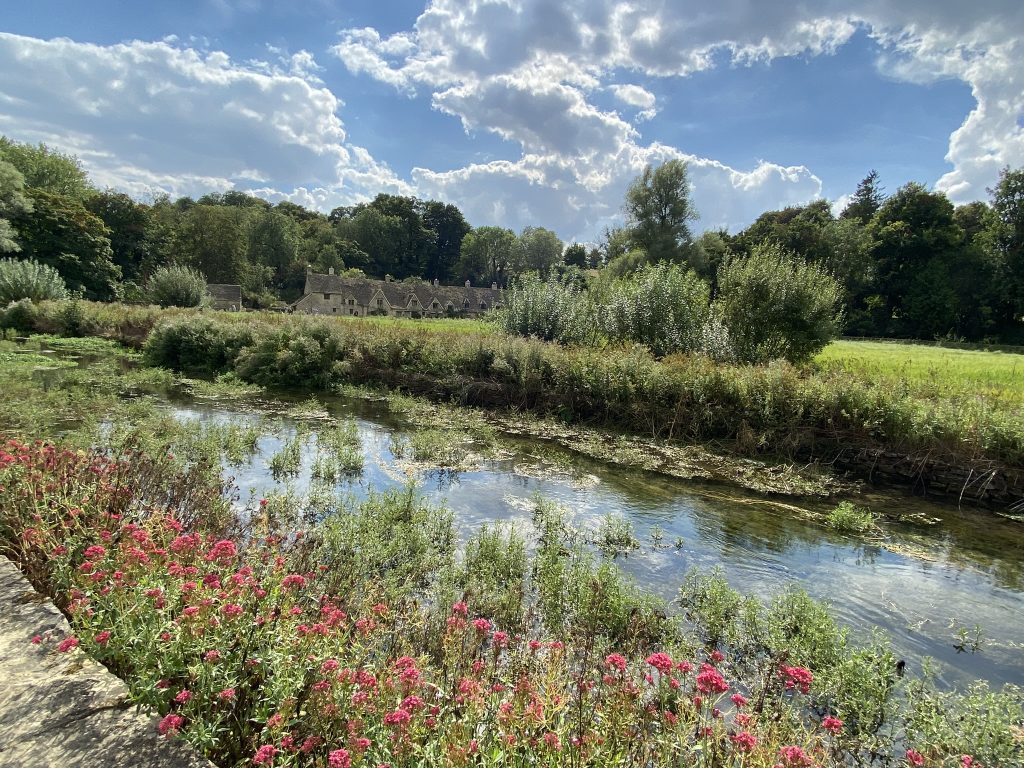
Bourton-on-the-Water
Bilbury is positively empty compared to Bourton-on-the-Water (#7), our next and final stop on the Go Cotswolds tour. It’s yet another gorgeous little village with the added attraction of having a river running through the center of the village. People paddle in the shallow water, stroll across the stone bridges, snap photos, eat ice cream, and generally enjoy a day out in the country.
But is is crowded! Fortunately, Colin offers to take anyone interested on a secret walk that promises to get us well away from the crowds in seconds. About eight of us follow him for what proves to be the highlight of the Go Cotswolds tour (which is saying something).
A Secret Walk in Bourton-on-the-Water
We head down a stone-walled side passage to emerge onto an expansive—and virtually empty—water meadow. Birds chips, the wind whispers, the views are entrancing, the crowds a bad memory. Yep—it’s the full on Cotswolds experience and we have it all to ourselves.
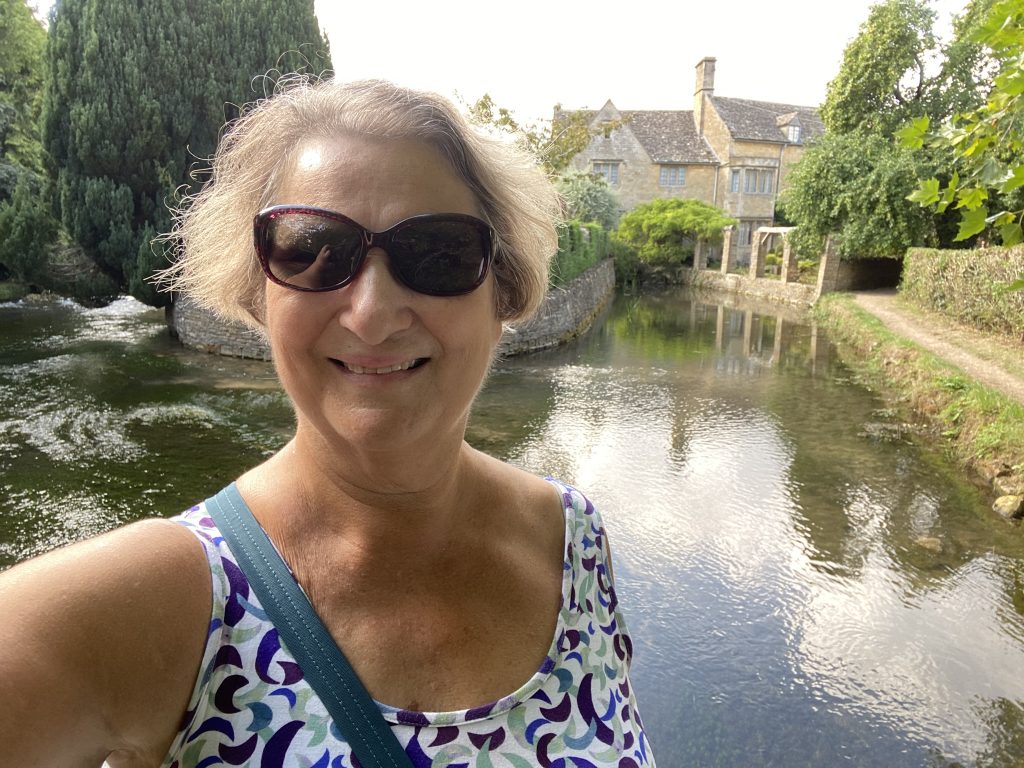
Colin leads alongside a small stream to the house he promises us we’ll all want to buy. He’s right—it’s an old stone beauty set on a bend in the river and even including a gazebo in its back garden. The next time I have a few million pounds to spare, I know where to spend it.
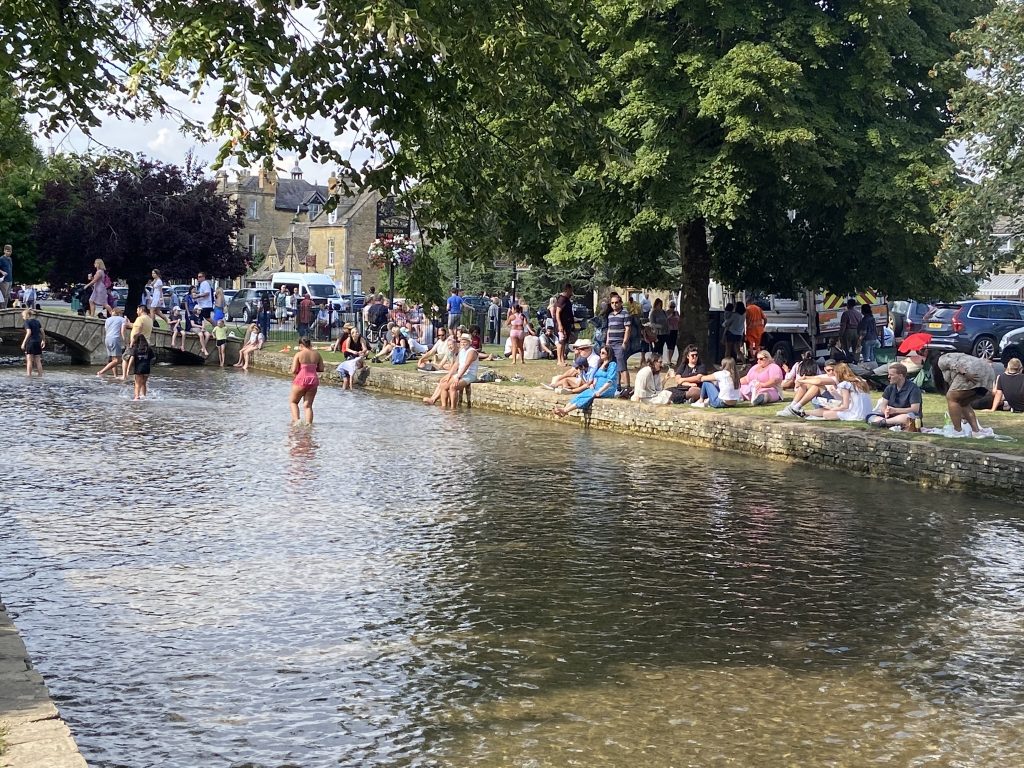
End of the Tour
An hour later, Colin drops me at Stratford-upon-Avon (#1) train station for my one-hour train journey to Birmingham. My day out in the Cotswolds has been glorious.
If you’re short on time and don’t want to drive, consider taking the Cotswolds-in-a-Day tour with Go Cotswolds. It’s a winner.
Here’s a similar tour also conducted by Go Cotswolds:
Conclusion
Have you visited the Cotswolds? Share your experience in the Comments section below.
Here are a few more posts about England:
